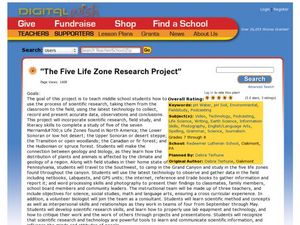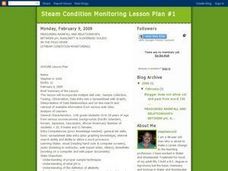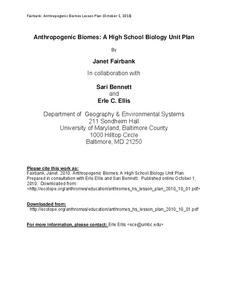Curated OER
Geneticist for a Day
Students discuss and compose a document discussing the transmission of the Huntington's gene- dominant or recessive, sex linked, etc. Additionally, they ought to consider Dr. Wexler's own odds for contracting the disease.
Curated OER
Genetics: Integrated with History and Art
Students work cooperatively in pairing chromosomes, created statistical genetic babies using the face lab, constructed a color DNA booklet and demonstrated mitosis in a flip book.
Curated OER
Ecology of the Dump
Students determine which types of garbage are biodegradable and which are nonbiodegradable. They practice measuring skills, hypothesizing, taking data, and writing a lab report. Students observe the relative biodegradability of metal,...
Curated OER
Comparing Ovaries And Testes
In this reproductive system learning exercise, students compare specimens of rat ovaries and testes. They complete 5 short answer pre-lab questions, follow an 11 step procedure and answer 5 analysis questions.
Curated OER
The Five Life Zone Research Project
Students study five of the seven life zones in North America. In this journalism lesson students use the Scientific Method working in teams. They use lab equipment and technology to create a presentation on five of the seven life zones...
Curated OER
Anatomy and Physiology "Quickies"
Students use a variety of creative writing tools within this assignment: poems on particular organ systems, write a short story and/or create a word graph. They are involved in a demonstration of lactic build up in the muscles, a...
Curated OER
Measuring Rainfall and Relationships Between pH, Alkalinity and Suspended Solids in the Pago River
Eleventh graders test the pH and alkalinity of Pago River. In this ecology lesson, 11th graders collect data and use spreadsheet to graph results. They analyze and share their findings with the class.
Curated OER
Seed Dispersion of Strawberries and Dandelions
Students investigate how seeds are dispersed on land. In this plant biology lesson, students use a dissecting microscope to study strawberry seeds and dandelion seeds, they draw what they see, then create a hypothesis on the seeds by...
Curated OER
The Challenge to Deliver Insulin
Students study the types of diabetes and why insulin is important. In this diabetes lesson plan students build molecular models and create a healthy lifestyle plan.
Curated OER
Osmosis and the Cell Membrane-part 2
Students participate in a review of diffusion and the basic properties of the cell membrane before exploring the process of osmosis in a lab activity. Using shell-less eggs that have soaked in various solutions, students make...
Curated OER
Discovering Mitosis in Onion Roots
Pupils discover the different stages of mitosis by examining onion roots under a microscope, drawing diagrams of what they see, and organizing collected data in a chart and create a pie graph from their lab data.
Curated OER
Modeling a Gene Pool
In this genetic worksheet, students examine how gene frequency changes in a population of organisms. After completing 5 pre-lab questions, they work in pairs to collect data and answer 5 additional post-lab questions.
Curated OER
Saving Big Cats from Extinction
Students explore extinction. In this biology and environmental science lesson, students define extinction, identify what living things need to survive, and create a persuasive poster about "saving the big cats" using a desktop...
Teach Engineering
Preconditioning Balloons: Viscoelastic Biomedical Experiments
What does stretching a balloon have to do with equilibrium? Groups explore preconditioning by stretching a balloon to a point of equilibrium. They then measure the amount of force required to stretch the balloon to the same point several...
Cornell Lab of Ornithology
Life In A Nest: Exploring Life Cycles With Bird Cams
Why read about it when you can watch it happen? Bird cams make it possible for learners to experience the life cycle of a bird in real time! An engaging set of lessons provides activities to connect their learning to bird cam...
Curated OER
Anthropogenic Biomes
If you teach a man to fish, he will never go hungry—or he will overfish and permanently damage the ecosystem? Address the traditional biomes as well as the human-included ecosystems and contrasts the biotic and abiotic factors in each....
Biology Junction
Arthropods
Even the creepy crawlers have pretty amazing anatomy! A thorough lesson describes characteristics of arthropods with an emphasis on their structures. Beginning with a review of the taxonomy hierarchy, the lesson explains the different...
National Park Service
It Was a Very Good Year
Waterton-Glacier International Peace Park includes whitebark pines that are over 1,200 years old, meaning they have been there since before medieval times. The second lesson of five details how to read tree rings for climate change and...
Serendip
Genetic Engineering Challenge – How Can Scientists Develop a Type of Rice That Could Prevent Vitamin A Deficiency?
Brown rice contains vitamins B and E, while white rice lasts longer in storage. The availability of rice around the world makes it a great candidate for genetic engineering. Scholars apply their knowledge of genetic engineering to solve...
Keep it Simple Science
The Earth in Space
Skim the surface of the earth with this brief, compact, summary of outer space. The sun, stars, galaxies, planets, and phases of the moon can be found in this all-in-one resource. Seventh graders will enjoy these simple worksheets to do...
Teach Engineering
The Keepers of the Gate Challenge
Help your class make a connection between salt water and nanoscience. In the introductory lesson of a seven-part unit, the class explores why salt water helps a sore throat feel better. Pupils conduct preliminary research about the...
Curated OER
Study of the Cell
Students draw a diagram to show the fluid mosaic model of a membrane. They explain how hydrophobic and hydrophilic properties help membranes hold their shape. They identify the functions of different cell membrane proteins as well.
Curated OER
Observing Decomposition
In this science instructional activity, students focus upon the concept of decomposition and collect data in order to make interpretations or observations.
Curated OER
What a Fungi
Seventh graders perform an experiment to determine the best growing conditions for molds. In this life science lesson, 7th graders explain where molds are commonly found. They collect data and draw diagrams of their observations.

























